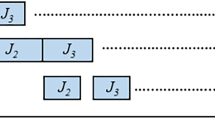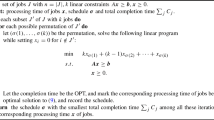Abstract
Suppose that a player can make progress on n jobs, and her goal is to complete a target job among them, as soon as possible. Unfortunately she does not know what the target job is, perhaps not even if the target exists. This is a typical situation in searching and testing. Depending on the player’s prior knowledge and optimization goals, this gives rise to various optimization problems in the framework of game theory and, sometimes, competitive analysis. Continuing earlier work on this topic, we study another two versions. In the first game, the player knows only the job lengths and wants to minimize the completion time. A simple strategy that we call wheel-of-fortune (WOF) is optimal for this objective. A slight and natural modification, however makes this game considerably more difficult: If the player can be sure that the target is present, WOF fails. However, we can still construct in polynomial time an optimal strategy based on WOF. We also prove that the tight absolute bounds on the expected search time. In the final part, we study two competitive-ratio minimization problems where either the job lengths or the target probabilities are known. We show their equivalence, describe the structure of optimal strategies, and give a heuristic solution.
Article PDF
Similar content being viewed by others
References
Baeza-Yates, R. A., J. C. Culberson, and G. J. E. Rawlins, “Searching in the plane,” Information and Computation, 106, 234–252 (1993).
Bansal, N., K. Dhamdhere, J. Könemann, and A. Sinha, “Non-clairvoyant scheduling for minimizing mean slowdown,” 20th Symposium on Theoretical Aspects of Computer Science, STACS’2003, LNCS 2607, pp. 260–270.
Benkoski, S., M. G. Monticino, and J. R. Weisinger, “A survey of the search theory literature,” Naval Research Logistics, 38, 469–494 (1991).
Borodin, A. and R. El-Yaniv, Online Computation and Competitive Analysis. Cambridge University Press (1998).
Charnes A. and W.W. Cooper, “The theory of search: Optimal distribution of search effort,” Management Science 5, 44–50 (1958).
Chrobak, M., L. Epstein, J. Noga, J. Sgall, R. van Stee, T. Tichy, and N. Vakhania, “Preemptive scheduling in overloaded systems,” 29th Int. Colloquium on Automata, Languages and Programming, ICALP’2002, LNCS 2380, pp. 800–811.
Cooper, D.C., J.R. Frost, and R. Quincy Robe, “Compatibility of Land SAR procedures with search theory,” prepared for U.S. Dept. of Homeland Security, 2003, available on http://www.uscg.mil/hq/G-O/G-OPR/nsarc/nsarc.htm
Damaschke, P., “Scheduling search procedures,” Journal of Scheduling, 7, 349–364 (2004).
Frost. J. R., “Principles of search theory,” part I–IV, in: Response, 17 (1999).
Gal, S., “On the optimality of a simple strategy for searching graphs,” Int. Journal of Game Theory, 29, 533–542 (2001).
Kao, M. Y. and M. L. Littman, “Algorithms for informed cows,” AAAI-97 Workshop on On-Line Search, 1997.
Kao, M. Y., J. H. Reif, and S. R. Tate, “Searching an unknown environment: an optimal randomized algorithm for the cow-path problem,” Information and Computation, 131, 63–79 (1996).
Kao, M. Y., Y. Ma, M. Sipser, and Y. Yin, “Optimal constructions of hybrid algorithms,” 5th ACM-SIAM Symposium on Discrete Algorithms, SODA 1994, pp. 372–381.
Koopman, B. O., “Search and screening,” OEG Report 56, Columbia Univ. Division of War Research, 1946.
Koutsoupias, E. and C. Papadimitriou, “Beyond competitive analysis,” SIAM Journal on Computing, 30, 300–317 2000.
Lopez-Ortiz, A. and S. Schuierer, “The ultimate strategy to search on m rays?,” 4th Conf. on Computing and Combinatorics COCOON 1998, LNCS 1449, pp. 75–84.
Lopez-Ortiz, A. and S. Schuierer, “Online parallel heuristics and robot searching under the competitive framework,” 8th Scandinavian Workshop on Algorithm Theory, SWAT 2002, LNCS 2368, pp. 260–269.
Mastrolilli, M., “Scheduling to minimize max flow time: Offline and online algorithms,” 14th Symposium on Fundamentals of Computation Theory, FCT 2003, LNCS 2751, pp. 49–60.
Motwani, R., S. Phillips, and E. Torng, “Nonclairvoyant scheduling,” Theoretical Computer Science, 130, 17–47 1994.
Myerson, R. B., Game Theory: Analysis of Conflict. Harvard University Press, 1991.
Stengel, B. V. and R. Werchner, “Complexity of searching an immobile hider in a graph,” Discrete Applied Mathematics, 78, 235–249 (1997).
Author information
Authors and Affiliations
Corresponding author
Additional information
This work has been supported by a grant from the Swedish Research Council (Vetenskapsrådet), file no. 621-2002-4574.
Rights and permissions
Open Access This is an open access article distributed under the terms of the Creative Commons Attribution Noncommercial License ( https://creativecommons.org/licenses/by-nc/2.0 ), which permits any noncommercial use, distribution, and reproduction in any medium, provided the original author(s) and source are credited.
About this article
Cite this article
Damaschke, P. Scheduling search procedures: The wheel of fortune. J Sched 9, 545–557 (2006). https://doi.org/10.1007/s10951-006-8788-y
Issue Date:
DOI: https://doi.org/10.1007/s10951-006-8788-y




